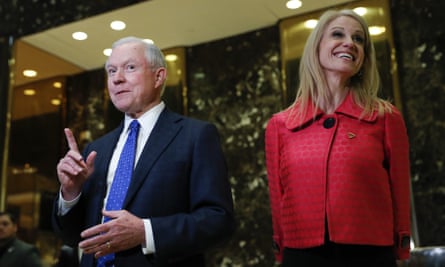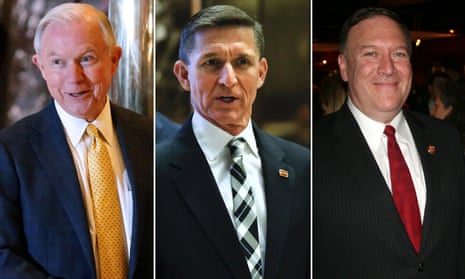Rights activists have condemned Donald Trump for three cabinet appointments they say could “undo decades of progress” towards racial equality and effectively legitimise the use of torture.
The US president-elect on Friday picked Senator Jeff Sessions as attorney general, Representative Mike Pompeo as director of the CIA and retired lieutenant-general Michael Flynn as national security adviser.
The hawkish trio have made inflammatory statements about race relations, immigration, Islam and the use of torture, and signal a provocative shift of the national security apparatus to the right. For liberals they appeared to confirm some of their darkest fears about the incoming Trump administration.
Sessions, a 69-year-old senator from Alabama, a state with a tormented history of segregation that spurred Rosa Parks’ bus protest, has been accused of racist comments in the past. He will succeed two African Americans – Eric Holder and Loretta Lynch – who served under Barack Obama.
Sessions, who has emphasised “law and order”, seen by some liberals as a coded phrase for discriminatory policing of minorities, would have huge power as head of the Department of Justice, grappling with issues such as police shootings of African Americans, as well as whether Trump’s defeated election opponent Hillary Clinton should face criminal prosecution over her mishandling of classified information.
Civil rights campaigners were quick to criticise his selection. Sherrilyn Ifill, president and director-counsel of the NAACP Legal Defense Fund, said: “Jeff Sessions has a decades-long record – from his early days as a prosecutor to his present role as a senator – of opposing civil rights and equality.
“It is unimaginable that he could be entrusted to serve as the chief law enforcement officer for this nation’s civil rights laws.”
Sessions, who has served in the Senate since 1997 and was the first member to back Trump’s anti-establishment campaign, will face a confirmation hearing before his peers on the Senate judiciary committee, probably in January. One liberal pressure group, People For the American Way, called for a demonstration at the US Capitol on Friday to demand that senators reject his nomination given his “lengthy history of bigoted rhetoric and policies”.
Democratic senator Dianne Feinstein of California promised “a fair and complete review of the nominee” while acknowledging she differs from him on many issues.
Sessions’ last confirmation hearing, for a federal judgeship under Ronald Reagan in 1986, was derailed when former colleagues testified that he used the N-word, called a black assistant US attorney “boy” and joked that the Ku Klux Klan was “OK until I found out they smoked pot”. He was also alleged to have called the NAACP and American Civil Liberties Union (ACLU) “un-American, Communist-inspired organisations”. He denied the claims but was rejected for the position.

Both organisations condemned Trump’s decision. Cornell William Brooks, president of the National Association for the Advancement of Colored People (NAACP), said: “The nomination of Senator Jeff Sessions to be attorney general, to serve as chief law enforcement officer of the United States, is deeply troubling. Senator Sessions’ record is one that suggests that he has stood in an old, ugly history in which civil rights were not regarded as core American values.”
Anthony Romero, executive director of the ACLU, said: “Senator Sessions has called the ACLU un-American and communist, assertions we flatly reject. His positions on LGBT rights, capital punishment, abortion rights and presidential authority in times of war have been contested by the ACLU and other civil rights organisations.”
Sessions’ ascent to the role of America’s top law enforcement officer fuelled concerns that white nationalists, including the Ku Klux Klan, will feel emboldened and licenced to spread their views with impunity.
Charles Chamberlain, executive director of Democracy for America, said: “The handful of people who might be even less equipped than Jeff Sessions to dispense justice on behalf of the American people typically spend their weekends wearing pointy hats and burning crosses.
“Jeff Sessions was too racist to become a federal judge. In the 1980s. The idea that Jeff Sessions might become attorney general is a genuine threat to our country and the lives and safety of people of colour, Muslim Americans, women and working families.”
And Lisa Graves, executive director of the Center for Media and Democracy, a national watchdog, said: “When Trump rhetorically asked African Americans what they had to lose in this election, this was a big one: a justice department that believes justice for all is its highest mission. With Sessions, ‘justice for some’ would likely be a more accurate motto.”
Republicans, however, rallied around the president-elect and his choices. Senator Lindsey Graham of South Carolina, an outspoken critic of Trump during the election campaign, said: “Senator Sessions is a fine, decent man and principled conservative.”
Senate judiciary committee chairman Chuck Grassley said: “He knows the justice department as a former US attorney, which would serve him very well in this position.”
Sessions was one of only nine senators who, in 2005, voted against a measure sponsored by Senator John McCain to prevent torture by the military under George W Bush. A year earlier, graphic photographs of army reservists mistreating prisoners at the notorious Abu Ghraib prison outside Baghdad became public. More recently he has questioned whether terrorism suspects should receive the protection of the US court system and objected to the planned closure of the prison on Guantánamo Bay.
The former federal prosecutor has also opposed nearly every immigration bill that has come before the Senate over the past two decades that has included a path to citizenship for immigrants in the country illegally. He is an enthusiastic backer of Trump’s promise to build a wall on the border with Mexico. Last year he wrote a 25-page report blaming job losses and welfare dependency on immigration.
Pompeo, 52, a third-term congressman from Kansas, was a surprise choice to lead the CIA. Elected to Congress as part of the 2010 Tea Party wave, he has enjoyed a quick rise, thanks in part to his penchant for incendiary statements about national security. After the Boston Marathon bombings in 2013, Pompeo falsely claimed that US Muslim organisations and religious leaders had not condemned terrorism. “Silence has made these Islamic leaders across America potentially complicit in these acts,” he said on the House floor.

Yet Pompeo took a place on the House intelligence committee and sits on its CIA and NSA subcommittees, where he has positioned himself as a vigorous advocate of the most hardline priorities of both agencies.
After the 2014 release of a landmark Senate report into CIA torture, Pompeo personally attacked Democrat Feinstein, the report’s leader, saying she had “put American lives at risk”. He called those at the CIA who participated in torture “heroes, not pawns in some liberal game being played by the ACLU and Senator Feinstein”.
Like Sessions, Pompeo has been a fervent opponent of closing the detention facility at Guantánamo Bay. And he has waxed enthusiastic about rolling back the minimal restrictions on the US surveillance apparatus enacted during the Obama administration, using descriptions of those restrictions that have not always been accurate. In a January op-ed in the Wall Street Journal, Pompeo incorrectly claimed the “collection of phone metadata under the Patriot Act was banned by Congress and finally ceased at the end of November”.
In fact, the USA Freedom Act of 2015 only restricted the bulk collection of domestic US phone metadata, without touching the vast powers the Patriot Act provides to the FBI for surreptitious collection of communications and financial data.

Flynn, 57, a retired US amy three-star general and one of Trump’s closest advisers, was fired from the Defense Intelligence Agency in 2014 – he has claimed this was because he told hard truths about the war on Islamist extremism. He has been a vocal critic of the Obama administration. When crowds chanted “Lock her up!” with reference to Clinton during this year’s Republican national convention, Flynn shouted: “Lock her up! Yes, that’s right, lock her up!”
Sarah Margon, Washington director of Human Rights Watch, said: “Michael Flynn has shown a stunning contempt for the Geneva Conventions and other laws prohibiting torture. By offering this key post to Flynn, President-elect Trump is undermining US commitments to international laws that have been broken to America’s detriment.”
Transition talks went on at Trump Tower on Friday. The tycoon faced criticism after it emerged that his daughter, Ivanka, and son-in-law, Jared Kushner, were allowed to sit-on a meeting with Japanese prime minister Shinzo Abe and were photographed with him.
On Saturday in Bedminster, New Jersey, Trump is due to meet Mitt Romney, the Republican presidential nominee in 2012. Romney has been a fierce critic of Trump but is now rumoured to be in contention for the prize position of secretary of state.
